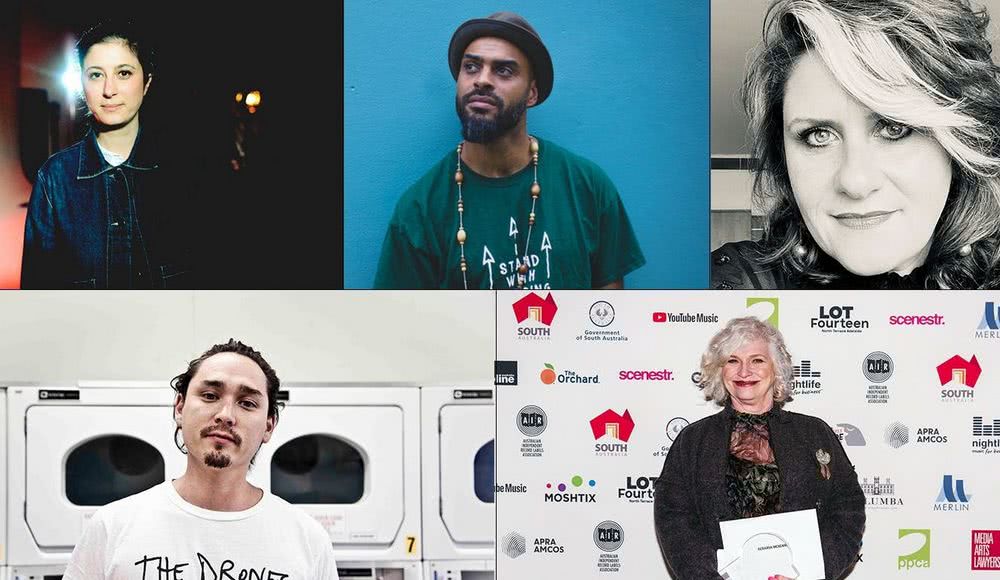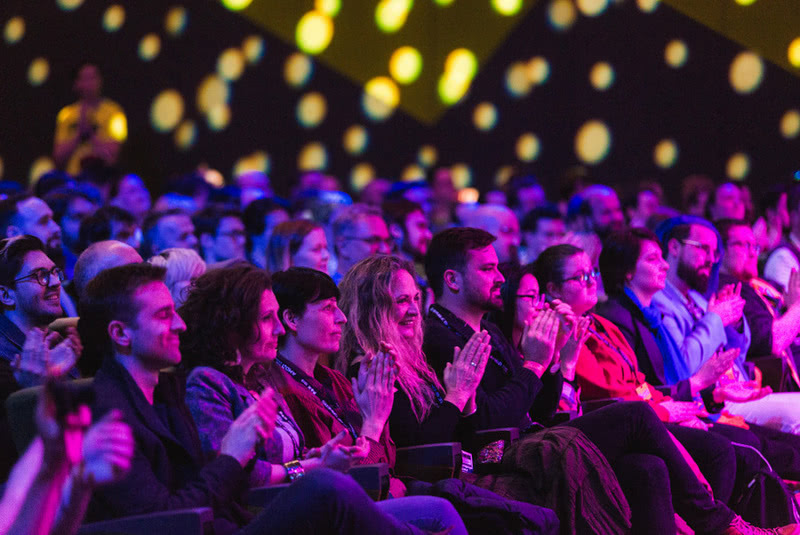Bonnie Dalton sets CLOCK, talks ‘life changing’ bootcamp & converting music biz skills into qualifications

A career in music is a life sentence. Want in, then settle down for a ride of late nights, hotels in strange places, long flights. It’s a long and winding road, with huge highs and an abundance of snakes (and sharks) if you know where to look. Watch where you walk.
A new study explores the ups and downs of a life in the creative industry.
Launched this week by the Victorian Music Development Office (VMDO) with RMIT University, Career Paths: The Victorian Music Business Career Life Cycle, interviewed 27 veteran music professionals to gauge the skills, strategies, challenges and the upshots of shaping a lasting career in this tricky industry.
The takeaways? All the study participants find their jobs rewarding. But they’re also exposed to burn-out, financial insecurity. And much more.
The music sector, explains veteran artist manager Bonnie Dalton, the newly-appointed General Manager of the Victorian Music Development Office (VMDO), is challenged by attrition rates, due to a host of factors, from long hours to high-pressure situations and more.
Reducing risk and improving wellbeing for music industry pros should be at the top of the checklist, and its fleshed out in the new report, the publication of which coincided with an intensive CLOCK Your Skills “bootcamp” for creatives industry practitioners.
The three-day session was facilitated by Denise Stanley, founder of CLOCK, which rolled out in the U.K. to give professionals with real-life experience the qualifications they might have missed out on.
Stanley was joined with Paulette Long (music publisher and artist manager), Michelle Escoffery (award-winning singer songwriter) and Claudia Matera (CLOCK programme manager). And participants included N’fa Forster-Jones (Cool Out Sun), Joel Ma (Joelistics), Gerada McKenna (White Sky Royalty Accounting), Lisa Palermo (Ellpee Management) and Emily York (Penny Drop).
“Back at the grind I feel different, with a newfound clarity and validation of my work and approach, skills and competencies,” notes participant Anna Jacobs, a freelancer on festivals and events including Splendour in the Grass, Dark Mofo, Boogie Festival and Brunswick Music Festival. “It has informed what I do and want to do, where I’ve been and where I’m going and how it all fits together.”
Dalton, a recipient of the Lighthouse Award for management, is up to speed with CLOCK, which enables music biz workers to jump straight into their career and then get the qualifications they may need to move higher up the ranks in their sector.
VMDO is now looking to roll it out in Victoria.
TIO caught up with Dalton for a primer.

Career Paths
TIO: Can you walk me through that “Road to Damascus” moment and how it related to your situation?
Bonnie Dalton: I actually saw a link to the CLOCK program in a Music Ally email at some stage before I went to London last January for the NY:LON conference. I’d done some reading up on CLOCK and loved the sound of it, so reached out to Denise Stanley Chard — CLOCK’s founder, creator, legend — and we met for a quick cup of tea at the RSA. The cup of tea turned into about three hours of mind blowing conversation about all of the things that I was trying to understand, let alone articulate, in regards to our music business community here in Victoria, in my new role as General Manager of the Victorian Music Development Office (VMDO).
To coin a phrase from another incredible woman in music, I was learning things Denise had long forgotten – because she’d moved so far past where I was, years and years ago. The idea that all the years of working and learning and pushing yourself out of your comfort zone, of being resourceful and innovative, all the things you do working in music, particularly in small businesses, could count for something, did count for something, was a bit of a revelation. I loved the idea that you could qualify at Masters level for knowing what all of that experience had taught you, and what you’d taught yourself.
The idea that the people I knew in music who were regularly asked to guest lecture at tertiary level, to come in as ‘the experts’ in music, didn’t have the qualifications they were lecturing in and would have had to sit in front of themselves to get it just never made sense, never mind the fact that the cost and time couldn’t be prioritised while those people were busily living it, doing it.
I knew that nobody really needed the piece of paper to get a job in music but it was more about validating those skills, recognising within yourself that ‘gut feelings’ and even ‘common sense’ were often actually high level, expert, embedded learning and that knowing and understanding how you work and why could only be of huge benefit.
And the piece of paper could certainly help portfolio careers add some more lucrative consulting into the mix, amongst other things. By the end of the conversation, Denise and I had the beginnings of a plan for a VMDO CLOCK pilot, where a couple of Melbournians would undertake the program. The fact that it is inherently an international program – you are assessed by ‘peer reviewers’ from two different countries when you undertake the program and the alumni includes people from right across Europe (and now, the world) – gave me even more confidence that theory would check out within the Victorian context.
More research and a business case saw the project pilot approved and Chelsea Gough (Native Tongue), Siobhan Kranz (Mushroom Group) and myself undertook the first VMDO CLOCK partnered program last year in Chengdu, China, following the Music Cities Convention, where Denise and I were both guest speakers. The bootcamp was intense but wonderful and all three of us can honestly say that we do work differently now with more confidence, more conscious awareness of our strengths but also of our values and generally just much more self-aware in a way that’s very productive and affirming.
What were some of the main outcomes of this year’s intensive bootcamp?
This year’s bootcamp only finished on Monday (Feb. 24) so we’re still gathering feedback from participants but it’s been overwhelmingly positive so far and the words ‘life changing’ have been used very liberally in discussions to date.
CLOCK Your Skills is particularly interesting. Can you explain how this higher education alternative would benefit career professionals in the creative industry? We tend to forget creative professionals need validation, right?
Yes, absolutely. The research we’ve just launched with RMIT, Career Path: The Victorian Music Business Career Life Cycle study, highlights the fact that people enter the music industry through a range of avenues and many of those do not include formal education. It’s also clear that people often work in contexts where progress isn’t necessarily marked or registered and where time for reflection and recognition is rarely a feature of the career life cycle.
It’s also an industry rife with ‘disruption’ so it can often feel like everything you knew is no longer relevant as everything changes around you. Of course, and as CLOCK demonstrates, so much is very relevant and the skills and abilities of so many people working in the industry is far greater than many people realise, transferable too.
I recently read an ad for a business college teaching ‘soft skills vital to business’, after which was literally a list of all the things I see people in music delivering in spades, but as invisible skills that would never be named, let alone celebrated. The benefits of what that validation brings includes an end to ‘imposter syndrome’ and an aid to working smarter rather than just harder, because once you’ve mapped how you work, it’s much easier to streamline it, to hone your processes and even to better match your goals to your values and find greater satisfaction. And if all of that means less burn out and more retention within the industry of the sorts of people I’ve been lucky to work with throughout my career in music, then that will be a huge boon for Australian music.
Is there scope for CLOCK to go national?
Well, we’re the VMDO so we’re quite happy for Victoria to keep the edge … but we love our national colleagues, so we couldn’t deny them CLOCK. There’s talk of the incredible CLOCK team who were here this week coming back later in the year so we’ll keep you posted when we find out more.
Through its programs, resources and initiatives, the VMDO will use the findings of the new study to help foster the next generation of Victorian music professionals.
This article originally appeared on The Industry Observer, which is now part of The Music Network.


































